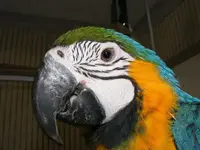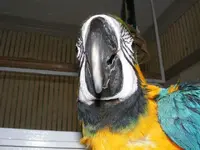TexDot33
Bird poop and baby poop
- Dec 26, 2006
- 2,576
- 10
- Parrots
- 15 year-old Sun Conure: Hamlet &
14 year-old Green-Cheeked Conure: Mac
I was told by our vet that there is absolutely no useful information on those
bands. I am sure that you could try to figure out the code if you found the Rosetta Stone but other wise, it's a waste of time.
There is no centralized data base for breeders that you can look for their information on your bird's band ... I am sure, however, that you could track down the breeder easily enough. These big shops usually only have one or two suppliers ...
bands. I am sure that you could try to figure out the code if you found the Rosetta Stone but other wise, it's a waste of time.
There is no centralized data base for breeders that you can look for their information on your bird's band ... I am sure, however, that you could track down the breeder easily enough. These big shops usually only have one or two suppliers ...


